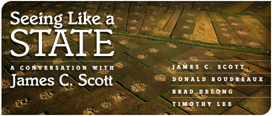This month we’ve been fortunate to have some very astute outside commentary on the discussion. Henry Farrell suggests that Seeing Like a State undermines Hayekian economics. Briefly, we face a tradeoff between homogenization of products, bringing economies of scale — and local knowledge, supposedly the engine of a laissez-faire economy:
[Friedrich] Hayek is remarkably incurious about the actual social processes through which markets work, and in particular the forms of standardization that are necessary to make long-distance trade work. I imagine Scott’s counterblast going something like this: It is all very fine to say that markets provide a means to communicate tacit knowledge, and it is even true of many markets, especially small scale ones with participants who know each other, know the product and so on. But global markets do not rely on tacit knowledge. They rely on standardization — the homogenization of products so that they can be lumped under the appropriate heading within a set of standard codified categories. Far from communicating tacit knowledge, the price system (and the codified standards that underlie it) destroys it systematically.
I think that this critique is hard for Hayekians to answer on their own terms. Hayek goes to some length to adumbrate economists for their failure to treat non-scientific and non-codified knowledge as important. If markets both distort production (by pushing towards products that can be standardized) and destroy knowledge (by lumping concrete things that are differentiated in important ways under abstract headings), then the Hayekian case for markets is at least qualified. One can still preserve the claim that modern markets preserve and communicate some aspects of non-codified knowledge. But one has to acknowledge that other forms of economic order can do this too (and at least under some circumstances may perhaps do it better, if Scott is to be believed).
I agree with the frustration about a lack of detail about markets. Nonetheless, I am more optimistic than this. Standardized products often fund a more general trade or communications infrastructure which the non-standardized products then piggyback upon. Think of funding a port with oil shipments (by the way, how many grades of crude are there?) but at the margin using it to trade strange toys as well. Alternatively, a highly standardized product can be communicating the (sometimes tacit) knowledge that liquidity and interchangeability and lots of direct competition matter more than does product diversity.
The Grossman-Stiglitz framework helps us think through the trade-off between the average and the margin. Let’s say that some trades shift into the more standardized, liquid market and out of the more idiosyncratic market. Some knowledge is lost. But at the margin, there is now a stronger incentive for information-gathering, or knowledge mobilization, in the less liquid market. It will be easier to beat the rest of the market (price is not much of a sufficient statistic) and so people will try harder.
This topic is related to the current controversy over whether swaps contract will be overly customized (wider spreads and harder to monitor and higher regulatory risk?) or overly standardized (more liquid but less useful?).
We weren’t able to determine exactly how many grades of crude oil there are, but it’s quite a few. A better example might be the elemental commodities, although for these it is difficult to see the value to the consumer of the lost producer-side local knowledge, aside from knowledge about externalities and titles. These though remain very important and are often the basis of competition in the elemental commodities markets.
Moving from information about commodities to information as a commodity, the Cato Institute’s Director of Information Policy Studies Jim Harper writes:
I stumbled across Scott when I was researching my book on identification policy, Identity Crisis. As Scott observes, naming systems for people have been altered over time from vernacular to formal, the latter serving the needs of governments and large institutions. The next step in the process is numbering (well underway, the Social Security number) and full-fledged national ID and possibly world ID systems. Such systems would be used to peg humans into their place in governmental, economic, and social machinery, obviously at a high cost to liberty and social mobility.
Twice in the paragraph above I used the passive voice to hide the actor. It was governments, of course, that pushed formal naming systems, but both governments and corporations will use our increasingly formalized and machine-processable naming systems to assign people their roles. Scott is far from a libertarian battler against government power, and he specifically disclaims having Hayekian aims in his book. This makes it all the more powerful and opens the door to interesting pathways of thought, parallels between corporate environmental destruction and government intervention in economic life, for example.
As always, your letters remain welcome. Send them to jkuznicki at cato dot org. Further feedback on this month’s issue is encouraged, and the four principals are invited to continue discussing through the rest of the month.

